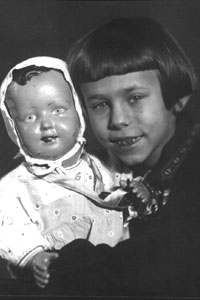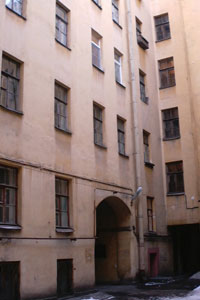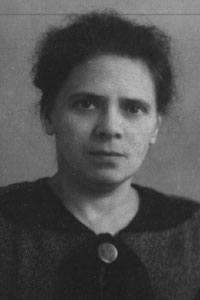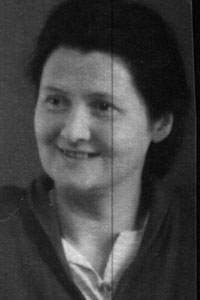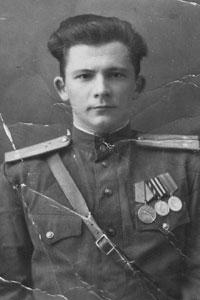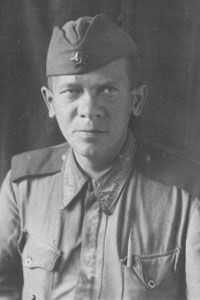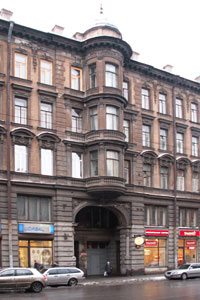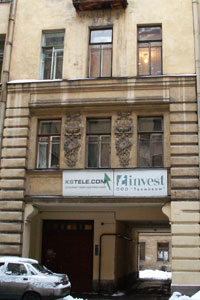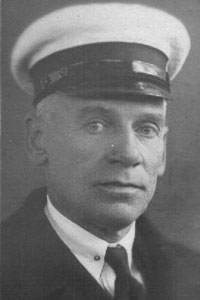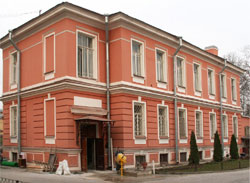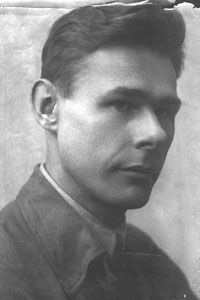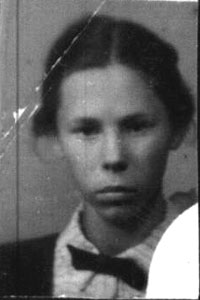Мамина блокада
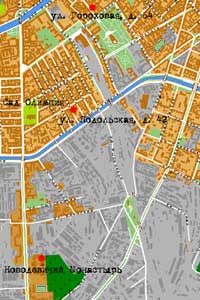
I asked my mum how they lived in besieged Leningrad?
This is what I learned from my mum.
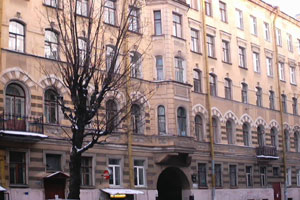
On June, 29, 1941 when my mother was 9, she lived with her family in Podolskaya street, 42 - 9. In the modern photo it is the left apartment with a bay window on the third floor.
Shelepina Irina Glebovna. 1940. |
There lived:
Shelepina Irina Glebovna - my mum (1932).
Shelepina Larissa Sergeevna - my grandmother (1903).
Shelepin Gleb Petrovich - my grandfather (1907).
Vorobjeva Vera Vasiljevna - my great-grandmother (1883).
Razygraeva Maria Vasiljevna - my great-grandmother's sister (1886).
Vorobjeva Vera Vjacheslavovna (1905) - stepdaughter of the great-grandmother Vera - the first wife of Vorobjev Apollonij Sergeevich (1902) - my grandmother's brother.
Vorobjev Jury Apollonovich - Vera and Apollonij's son (1925).
Before the war the family was going to move to the country ( the village of Kartashovka. They hired a country house before the beginning of the war, in winter 1941. The family prepared for the summer season in advance, and they bought food for all the summer. They bought cereals, sugar, tea, coffee, kerosene - there was no electricity in the village, and they illuminated the house with кerosene lamps. All this was supposed to be taken to the village by the lorry, together with utensils, mattresses, blankets and other things in order to free themselves from carrying the supplies on them during all the summer. Before the war, my mother's father - Gleb Petrovich Shelepin, who was a pace-maker at his factory, was sent to Moscow, to the Exhibition of Economic Achievements. He returned to Leningrad when the war had already begun. The family didn't go to the country that summer. That summer the family was also going to repair their big, five-room apartment in which they had been living since 1908.Those days they used to glue the wall-paper with flour and joiner's glue. All those materials had been already purchased by the time when the war broke out. Those stocks saved the lives of my relatives when the city was besieged.
September, 8, 1941 was the first day of the blockade. Food supplies disappeared from the stores. Ration cards for food were introduced.
As it was already the second period of starvation in the lives of my relatives, they at once began to spare food accurately. When bombardments of Leningrad began, all the family (seven persons), moved to two small rooms near the kitchen. Windows of the kitchen and of those two rooms looked to the yard.
Podolskaya street, 42 |
There was a stove, and in the kitchen there was an oven working on wood. In other rooms with the windows on the front wall of the building, all the windows were broken. The doors in those rooms were covered with the old blankets not to let wind and cold in. Later those windows were hammered with the plywood sheets. The family used to drink thin coffee, to eat pancakes, made of flour and water. They gradually burnt wooden furniture, but they were not strong enough to cut large furniture into pieces. They also burnt the library in which there were many old and very interesting books. My mum was reading those books. She remembers, that during the blockade she read Maupassant's stories and looked through many books on art. She also remembers Brockhaus and Efron's encyclopedia. All those books were burnt down. There was a piano and they used to play it before the war. But during the blockade a lot of music sheets were burnt. My mother's favourite big doll made of painted cardboard was burnt too. All the stocks finished only by the spring of 1942.Then they had to kill and eat a domestic cat and a dog.
In the winter my mum was all wrapped up and she had warm boots - burochki. While the parents were at work, the children went out themselves. There were barricades of logs and boards in the streets. Barricades were higher than human size. There were embrasures in them as well as the passageways for pedestrians. There were huge snowdrifts and the children helped to remove snow from the yards.. The yard keepers threw snow through the gangways in the barricades, and children on plywood sheets dragged it to the Obvodny canal where they emptied it.
They used to take water on Moskovsky prospect (at that time it was called International prospect), opposite to Olympia garden. There was an open hatch in which there was water even in winter. Near house # 37, at Malodetskoselsky prospect there was a special water tap, but it was in order only during warm time. They usually washed clothes there. When they were unable to get to Moskovsky prospect, they went to the roof of their house, and there took some snow. They put snow into the big oval basin, where it gradually melted. In Vereyskaya street there stood a huge tank with boiled water.They could take water there, but they had to wait in a long line. It was my mum who did it. She took a big copper kettle in which water would not cool down on her way home. She took that water home, but a full kettle was too heavy for her to carry. My mum had become very weak by that time and she could fall down and scald herself with boiled water.
Yard keepers worked during all the blockade, they went to the apartments - in search of the dead. Yard keepers put "ownerless" corpses just at the front doors, or in the court yard, then there came the lorries and took the bodies away .Those alive relatives who had some forces, brought the dead to the special places. They put the bodies wrapped up in bed sheets or in blankets on children's sledges and pulled them along the streets. There was no running water and sewerage in the houses because the water supply systems were out of order. They were frozen. People dumped all wastes in the court yards and sometimes even at the staircase. The smell was terrible.
Once a real holiday happened. Before the war my mum was very whimsical, and did not like to eat. She hid pieces of sandwiches on the table-top of the big sliding table latent below, and once during blockade they found those treasures. Those were dried slices of white bread and pieces of dried sausage. It was a feast for all the family!
|
My grandmother, Larissa Sergeevna Shelepina, worked at "Lenzhilremstrojtrest" ( Architecht Rossi street). The working day lasted 12 hours. They had to be on duty on the roof and to extinguish incendiary bombs, and they also had to disassemble the ruins. My mum also helped. My great-grandmother, Vera Vasiljevna Vorobjeva, and her sister, Maria Vasiljevna Razygraeva, worked at the Leningrad Central Telegraph. They had to stay there all the time and they could come home only once a week. My mother's aunt - Vera Vjacheslavovna worked somewhere in a buffet. Yura, her son, worked at the Vitebsky railway station as an electrical engineer though he was only 15 years old. All of them went to work on foot. My mum stayed home alone.
During the bombardments my mum did not go down to the bombproof shelter, and was sitting in the doorway because in the house there was very thick brick wall. When bombs fell on houses, shelter were oftendestroyed and filled with broken parts of the buildings, and the people inside perished in most cases. At the beginning of the blockade the family several times went down to the bombproof shelter which was in the cellar of their house. The entrance to the shelter was downstairs. But later they stopped going there. One of the friends lived not far. When a bomb got into his house, his room was not destroyed, even the bed on which he usually had slept, was not broken. But he perished in the shelter under the debris.
My grandmother Larissa Sergeevna Shelepin's brother, Apollony Sergeevich Vorobjev, was by that time married for the second time. When the war began, he lived with his wife near the cemetery Volkovskoye.
|
Apollony Sergeevich almost died in winter 1941-42. My great-grandmother, my grandmother and my mum have brought him on sledge to their home. Vera Vjacheslavovna - his first wife saved his life. She was sent to work very far from the centre. She had ration cards of her own and of their son Yuri. And she was lucky to receive three loaves of bread at once and a can of grease. And she brought all that home. She cut off two slices of bread, spread grease on one of them and gave it to Apollony. She also spread grease on the second slice and put it under the pillow. It was dangerous to eat both slices at once after having not eaten for a long time. You had to feed the starving organism in very small portions. Apollony Sergeevich survived. Later he was drafted and put into the hospital.
My mother's granduncle, Eugeny Vasiljevich Razygraev (1882), the brother of my great-grandmother Vera Vasiljevna Vorobjeva, died of famine in the beginning of 1942, in my mother's presence. It was already impossible to help him...
My mother doesn't remember why she happened to be at their place. Since everybody went to work, she was probably left with Eugeny Vasilievich and his wife Maria Konstantinovna (Doneman) who were not leaving their apartment on Gorochovaya, 64 ( the house where Rasputin had lived).Maria Konstantinovna died the first. Her husband didn't get up anymore.
|
They lived in Gorohovaja street, 64, in a big apartment above the arch in the court yard of the house. Before the revolution Grigory Rasputin lived there. Maria Konstantinovna died the first. After her death her husband did not get up any more. He was lying in bed all the time. He had hallucinations because of famine. He saw cockroaches creep on the wall. Two days later he also died . The place where dead people were collected, was just where the Young Spactators' Theatre is located now. Corpses from all over the district were taken there. Yura and great-grandmother Vera brought the bodies of their dead relatives there.
When Eugeny Vasilievich and Maria Konstantinovna died, their relatives managed to sell their Becker concert piano for three loaves of bread. All the valuables were exchanged for food when possible.
Grandmother Larissa exchanged the gold watch with small brilliants - the present of her mother for her 20 -th birthday - for a bowl of a millet cereal..
Usually they exchanged with the military men who were better supplied with food.
The city was considerably destroyed. Between Bronnitskaya and Serpukhovskaya streets there was a big, two-storied kindergarten. A bomb got into that kindergarten, and for a long time the cries were heard from under the debris. The movie theatre "Kosmos" was built on that place after the war.
In the spring the grass appeared. In the summer mum with the big bag went along the Obvodny Canal and along the railway to the Park of Aeronauts - and picked wild herbs. They made something like pancakes from those herbs.
In the winter of 1941-42 mum did not study. Mum did not go to the second class - schools were closed, and Maria Vasiljevna Lebedeva, a friend of great-grandmother Vera Vasiljevna - was a teacher, and she took care of my mother. She came to us and taught my mother to write and to draw. She was older than my great-grandmother and was already retired. Maria Vasiljevna died in December, 1941. Larissa Alekseevna Lebedeva, her daughter, was a student at that time. In 1941 she finished the first year of the College of Mines, and in summer the students were sent to dig entrenchments around Leningrad. In the autumn of 1941 the studies in the institute didn't begin, and Larissa got a job of a driver of the lorry at the factory named after Karl Libkneht. In 1943 her house on Kolyaeva street, 14 was destroyed by a bomb, and she moved to my mum's parents. By that time, Vera Vjacheslavovna with her son Yura, had already been evacuated from the city. Yura entered the artillery school and even took part in the war. My mother didn't leave the city because her mother could not go, and did not want to send the girl alone.So my mum remained in Leningrad with her parents up to the end of war.
In 1942 schools began to work again. My mum became a pioneer, and her neigbour presented her a silk pioneer tie. But she didn't attend school, because she was sick most of the time. There were ulcers on her hands, and one of the fingers dangled on a dangled on a strip of skin, so she was treated for a long time. In 1943 boys and girls began to study in separate schools. Mum studied in school on Podolskaya street, 4. It was terribly cold in the building of the school.
In 1944 mum, Nina Egorova (the distant relative of the family) taught German at school, located in one of buildings of Novodevichi monastery on Moskovski prospect. Nina Egorova picked my mother up on her way to school and they went there on foot together. In the cellar there was a dining room. During the brakes the children walked around Novodevichi cemetery. At that time, there was a sawmill in the church, the children took there sawdust and bark to heat the classes. they dragged this sawdust in big baskets. In each class there were 10-15 children. It was a seven-year school. After graduation children went to professional schools. There they got food ration cards and worked on machines.
|
My mum sais that she used to go to school even during artillery bombardments. But she didn't care, because at school she could get a portion of liquid which was called soup.
There were cases of cannibalism. My mother's schoolmate hardly escaped from a cannibal who struck her on her head. Until now she has a scar on her head.
The mother's schoolmate, in blockade nearly have not eaten, her have struck, she still had on a head big wound, but she any miracle has escaped from these people and has managed to escape. My mum saw corpses in the streets with the cut out soft parts of a body .
Before breaking of blockade in 1944, the Germans were firing along the Moskovski prospect. Grandmother Larissa ran home during that bombardment to see hand she couldn't find her at home because Irina had hidden herself under the bed - so scared she was.
In 1943 mum went to the young pioneer's club on Malodetskoselski prospect, and on Marat street.In 1944 she attended technical circle and gymnastics in the Palace of pioneers . After the war, in the summer of 1945, there was organized a kind of a town camp, and my mother attended it every day.
Gleb Petrovich Shelepin |
Up to September, 1942 my grandfather - Gleb Petrovich Shelepin, worked at a weaving mill named after Dzerzhinski as a shop superintendent. This factory produced fabric for groundsheets. Sometimes he got some oil and majs - sedative left from liquid repellent used to make fabrics waterproof. They ate it.
In the autumn of 1942 grandfather Gleb was drafted and sent to the Leningrad front.
At the end of 1943 he was wounded, and got to the hospital in Leningrad. The last letter from him was dated January, 31, 1944. He wrote, that he was recovering. Soon he was sent back to the front and was missing. Before leaving he came home, but didn't find anybody. He left a note, saying that he was going to the meeting point near Narvski Gates, but when my mum with my grandmother came there he had already left.
My mother doesn't like to speak about that time. It is very painful for her to recollect all that in her memory. When she remembers all that nightmare she cannot fall asleep…
Mum, very much does not like to tell about war, speaks what to recollect hardly, hurt, and then again to not forget this nightmare, it is impossible to fall asleep.
Shelepina Irina Glebovna. 1945. |
|
Gleb Drapkin 2008


